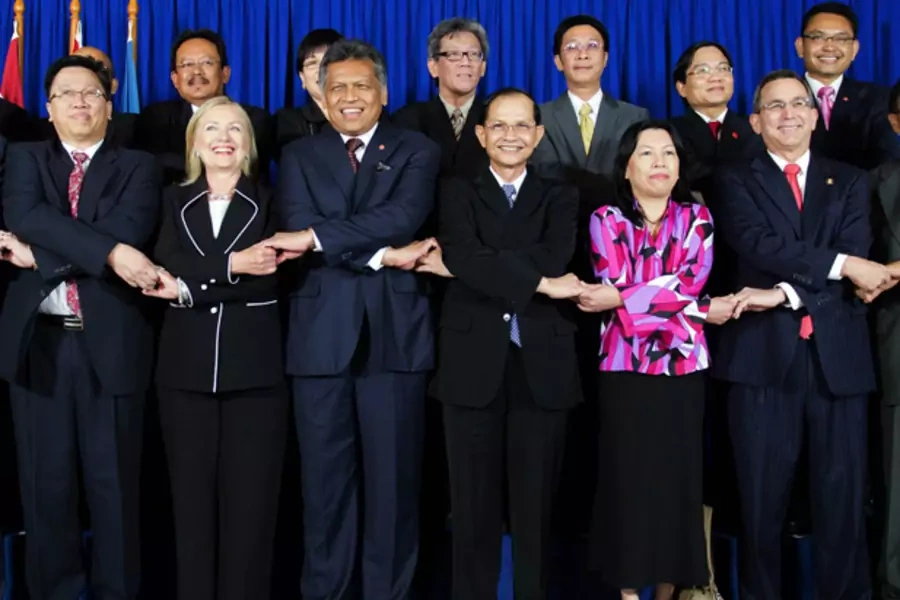Does the ASEAN Human Rights Declaration Even Matter?

More on:
Elizabeth Leader is a Research Associate for Southeast Asia at the Council on Foreign Relations. The author’s views on ASEAN’s human rights progress do not necessarily reflect those of Joshua Kurlantzick.
The Asia-Pacific remains the only UN-defined region that does not adhere to its own human rights treaty or possess a region-wide mechanism for the promotion and protection of human rights. Thus, there was seemingly a lot riding on the backs of the ten ASEAN foreign ministers who gathered in New York on Thursday —on the sidelines of the UN General Assembly— to review the second draft of the ASEAN Human Rights Declaration (AHRD). Concern over the controversial draft (drawn up by the ASEAN Intergovernmental Commission on Human Rights) has, in the international media, far outweighed any sort of praise. Among the many aspects of the AHRD facing criticism are the possible inclusion of “public morality” as justification for suspending human rights, the opaque fashion in which the document was drafted, the limited participation of civil society organizations in its creation, and its failure to reference many of the marginalized populations who are in dire need of protection (including minorities, the LGBT community, and persons with disabilities). Regardless of the inclusion or exclusion of these aspects, the fact remains that without a corresponding mechanism for enforcement, the AHRD, no matter how forceful its language, will be largely damned to irrelevance.
In his 2006 book Southeast Asia in Search of an ASEAN Community, former ASEAN secretary-general Rodolfo Severino rationalized ASEAN’s inability to formalize a unified, meaningful stance on human rights: “In the face of such wide divergences in the situations and conceptions of human rights among ASEAN countries, it is hardly feasible for ASEAN to construct a system for intervening in one another’s affair on the grounds of violations of human rights.” While citing the region’s diversity is arguably a ‘cop out’ for ASEAN’s failure to institutionalize respect for human rights, the international community must nonetheless recognize the reality that is ASEAN’s consensus-based decision-making process, and how this will fundamentally preclude progress on human rights promotion and protection for the foreseeable future. One is hard pressed to find any aspect of human rights for which shared norms or common experiences unite ASEAN’s ten member states. In terms of LGBT rights (a population whose exclusion from the current draft has received international condemnation and media attention), for example, Thailand is seen as one of the most tolerant countries in Asia, while in neighboring Myanmar homosexuality is illegal. No amount of ministerial meetings is likely to bridge such a cultural divide. Indonesia’s foreign minister Marty Natalegawa was candid in his recent admission that “state interests of each nation are also different from one another. Hence, a document that must be reached via consensus will never please all parties.”
Above all, national self-interest will continue to dictate member states’ decision-making. Despite international concern for the treatment of Rohingya Muslims in Rakhine State, Myanmar, Muslim-majority countries such as Indonesia and Malaysia are unlikely to intervene for fear that other countries may in turn attempt to dictate citizenship standards within their own borders. Thailand, once seen as a beacon of democracy in the region, will not chastise Vietnam’s recent jailing of bloggers for fear that its own, draconian Lèse-Majesté law and the associated Computer Crimes Act will face censure from its neighbors. As long as ASEAN remains an intergovernmental body and not a people-powered institution, the “ASEAN way” will remain one of noninterference, and it is improbable that the protection of human rights will be paid little more than lip service.
Instead, the resources and efforts of Western governments and international NGOs would be better spent focusing on grassroots movements, working bilaterally with the individual governments of member states, and working multilaterally with those networks that are not bound by the rigidities of ASEAN. The Southeast Asia National Human Rights Institution (SEANHRI), for example, unites the existing, independent human rights commissions of Indonesia, Malaysia, the Philippines, and Thailand (as well as that of ASEAN non-member East Timor). Its website is funded by a European Commission project entitled "Enhancing the Role of National Human Rights Institutions in the Development of an ASEAN Human Rights Mechanism." Contrary to the ASEAN Intergovernmental Commission on Human Rights which lacks the ability to hear cases from individuals, organizations, or groups of people, a recent article in the Bangkok Post described the members of SEANHRI as the “most accessible” human rights mechanisms in the region. There is an opportunity for these commissions to set an example for their neighbors. In 2011, Myanmar established its own human rights commission (although the international community has yet to recognize it as independent, and it has thus far avoided investigation of human rights abuses in conflict-riddled ethnic minority areas). Earlier this month in Chiang Mai, Thailand, the Myanmar National Human Rights Commission was admitted to SEANHRI. Perhaps, in time, Myanmar’s commission will benefit from the exchange of best practices.
The right of marginalized populations in Southeast Asia to be included in the AHRD is undeniable. Their inclusion in the declaration would send a powerful signal to not only ASEAN, but also the greater Asia-Pacific region and the entire international community. But, short of a miracle, a satisfactory AHRD is unlikely to come to fruition in the near future —and prospects for its enforcement are even dimmer. In the meantime, concerned governments and NGOs should continue to explore means of human rights promotion and protection that operate independently of ASEAN.
More on:
 Online Store
Online Store